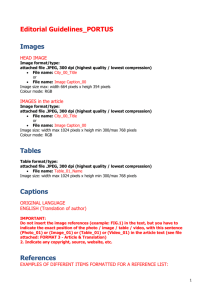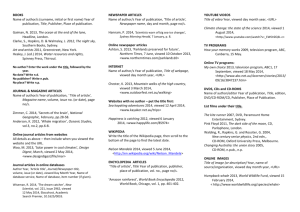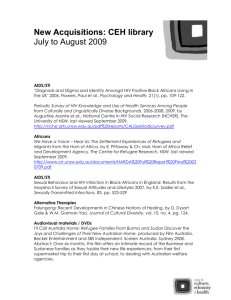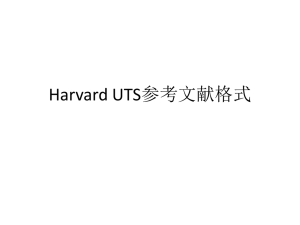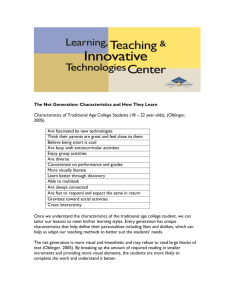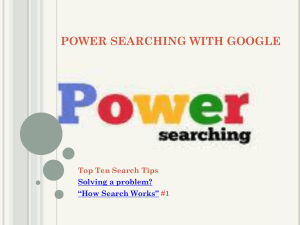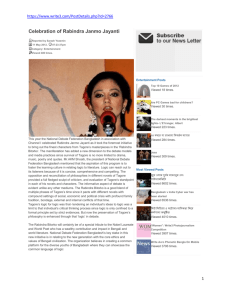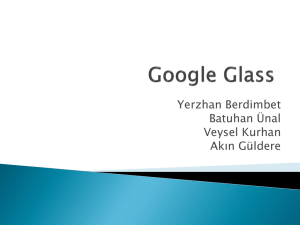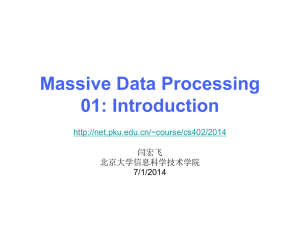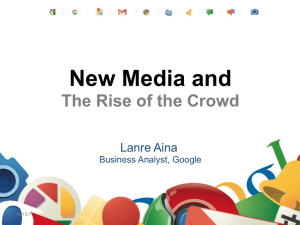Information Seeking Behaviour: A comparison - BP140
advertisement
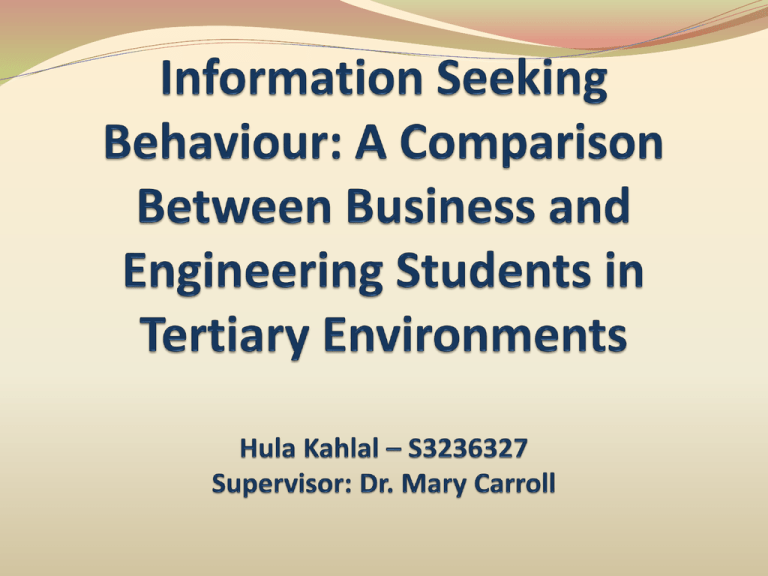
Topic Selection: Information available on the web Debates about Information Seeking Behaviour Investigate the presence of the academic library Methodology: Online survey using SurveyMonkey.com Target: Business and Engineering students Desired no. Of respondents = 40 Actual no. Of respondents = 42 Desired time limit to respond = 7-10 days Actual time taken = 3-4 weeks Challenges faced: Software’s useful features need to be paid for Survey errors discovered Collecting responses A variety of information available on the web Some participants found the survey a little confusing Research Findings: Age of Participants: 0% 33% Under 18 18-22 23+ 67% Research Findings: Methods used to search for information for a university task Business students Primary source Google and other search engines Secondary source Databases & library e-materials Last option Library hard copy resources Engineering students Primary source Materials given by academics Secondary source Google and other search engines Last option Library hard copy resources Research Findings: The use of Google and other search engines Business students Students always formulate key words using the question given Students often scan through the information found to decide its relevance Sometimes, some students copy the information found into their paper; others, rarely or never do so. Research Findings: The use of Google and other search engines Engineering students Students always develop more keywords as they proceed with their searching process Some students often formulate the answer in their own words, others tend to copy the information into their work Students rarely or never narrow down their result list Research Findings: The use of the academic library Business students 40% of participants were not fully familiar with the services the library offers 40% were familiar enough with how the library materials are organised 60% rarely or never look for materials written by a specific author 60% sometimes ask for the help of a librarian to find relevant resources 45% end up using library hard copy materials in their work Research Findings: The use of the academic library Engineering students 42% of participating students are sometimes familiar with the services the library offers 38% are sometimes familiar with how the materials are organised in the library 67% rarely or never look for materials written by a specific author 48% rarely or never ask for the help of a librarian to find relevant information 38% often go to the library, hoping for the best 48% sometimes end up using library materials in their work Research Findings: Feelings associated with ISP Business students 16 14 12 10 8 Always Often 6 Somtimes Seldom/Never 4 2 0 I am stressed when I first read the assignment task to be completed I feel a little I feel I slowly gain my I am fully relieved when I overwhelmed with confidence after confident after the start my search the amount of more in-depth task is done information I search usually find Research Findings: Feelings associated with ISP Engineering students: 12 10 8 Always 6 Often Sometimes 4 Seldom/Never 2 0 I am stressed when I feel a little I feel overwhelmed I usually feel more I am fully the assignment relieved when I with the amount of confident after confident after the task is given start my search information I more in-depth task is done usually find search Conclusions: Aim: to reveal any common patterns between Business and Engineering students Does subject specialisation affect the way students search for information? Research findings supported the current literature Common patterns were evident References: Barnes K, Ferries S & Marateo R 2007, ‘Teaching and Learning with the Net Generation’, Innovate journal of online education, vol. 5, no. 6, viewed 2 March 2011, http://innovateonline.info/pdf/vol3_issue4/Teaching_and_Learning_with_the_Net_Generation.pdf Kozma, R 2003, ‘ICT AND EDUCATIONAL CHANGE’, technology innovation AND educational change a global perspective, 1st edition, International Society for Technology in Education, Oregon USA, viewed 2 March 2011, http://books.google.com.au/books?hl=en&lr=&id=7IWcRIpY3JYC&oi=fnd&pg=PA1&dq=technology+and+education&ots=jz-IW444N_&sig=qTYETaF3_0NYCnlcEyn73fIGS4#v=onepage&q=technology%20and%20education&f=false Kuhlthau, C.C 2010, Information Search Process, Rutgers School of Communication and Information, viewed 2 march 2011, http://comminfo.rutgers.edu/~kuhlthau/information_search_process.htm Kuhlthau, CC, HeinstrÖm, J. & Todd, RJ 2008, ‘The 'information search process' revisited: is the model still useful?’ Information Research,vol. 13, no. 4, viewed 2 March 2011, http://InformationR.net/ir/13-4/paper355.html Lippincott, J.K, Net Generation Students and Libraries, Educause, viewed 2 March 2011, http://www.educause.edu/Resources/EducatingtheNetGeneration/NetGenerationStudentsandLibrar/6067 Nicholas, D, Rowlands, I, Clark, D & Williams, P 2011, ‘Google Generation II: web behaviour experiments with the BBC’, Aslib Proceedings: New Information Perspectives, vol. 66, no. 1, pp. 28-45, 2 March 2011, Emerald Oblinger D.G & Oblinger J.L 2005, ‘Technology and the Learning Expectations of the Net Generation’, Educating the Net Generation, Educause, Washington DC, USA, viewed 2 March 2011, http://net.educause.edu/ir/library/pdf/pub7101b.pdf Tapscott, D 2009, ‘Research methods, teams and acknowledgments’, Grown up digital, The Mc-Graw Hill companies, New York USA, viewed 2 Mach 2011, http://books.google.com.au/books?id=DWlIY1PxkyYC&printsec=frontcover&source=gbs_ge_summary_r&cad=0#v=onepage&q&f=false Timmers, C & Glas, C 2010, ‘Developing scales for information-seeking behaviour’, Journal of Documentation, vol. 66, no. 1, pp. 46-69, viewed 2 March 2011, Emerald Wislon, T.D 1981, ‘On user studies and information needs’, Journal of Librarianship, vol. 37, no. 1, pp. 3-15, viewed 2 March 2011, http://informationr.net/tdw/publ/papers/1981infoneeds.html Wislon, T.D 1999, ‘Models of information searching behaviour research’, Journal of Documentation, vol. 55, no.3, pp. 249-270, viewed 2 March 2011, http://informationr.net/tdw/publ/papers/1999JDoc.html
